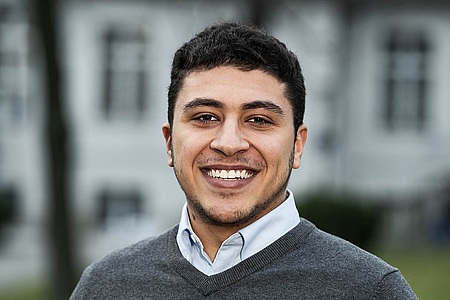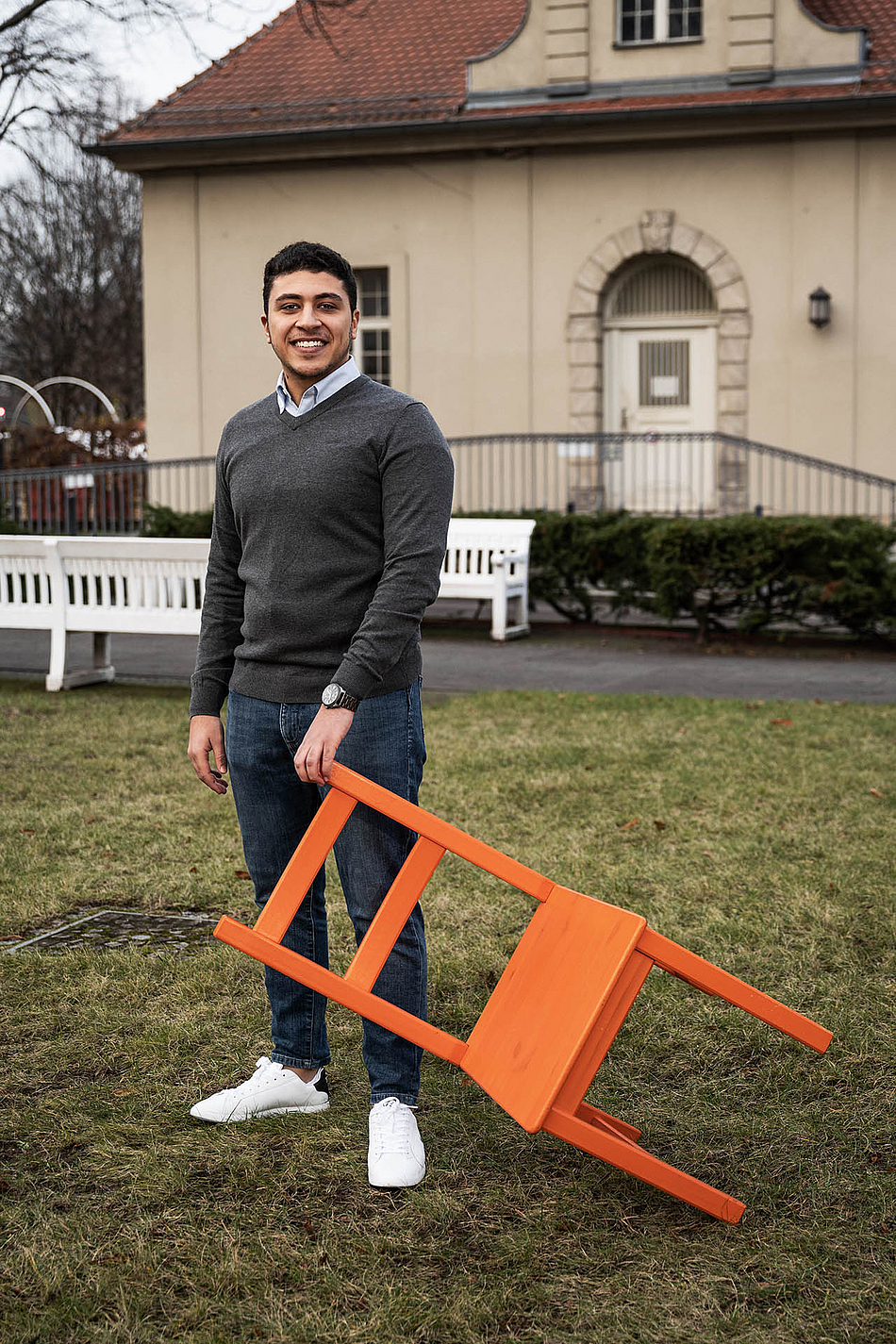Facing obstacles with confidence and generosity
Ahmed Farghaly has studied medicine at Charité – Universitätsmedizin Berlin for the past year and a half. Stiftung Charité has funded his studies as a recipient of the Deutschlandstipendium. We spoke to him in a virtual interview in December 2020 when he was in the midst of a hybrid-semester as a result of the pandemic. He talked to us about his studies and commitments during the pandemic along with the extraordinary chain of events that brought his family from Egypt to Berlin.
Mr Farghaly, studying medicine didn’t originally look like it was in the cards for you. You seemed to move between medicine and computer science. What persuaded you to opt for medicine?
I was gifted when it came to computer science at school and even participated for Egypt in the qualifying rounds of the International Olympiad in Informatics. I like the solution-based approach of programming, but never quite felt the world of informatics was for me. I want to be able to help others directly. Of course, you can improve people's lives as a programmer. But not quite as directly as in the capacity of a doctor. In order to discover whether medicine was the right choice for me, I traveled to Nepal in 2017 to do some voluntary work for a short period. I spent my time there working at a children’s hospital in Kathmandu. My time in Nepal taught me that medicine truly is something special and health is the best gift you can receive. Not money, fame or power—always health.
You’ve studied medicine at Charité – Universitätsmedizin Berlin since 2019. How do you find it?
I’m really enjoying it. I originally wanted to study abroad in an English-speaking country, but my family simply couldn’t afford the tuition. When I was on a school trip to Berlin, I discovered that many German universities are also tuition free to international students. Back in Egypt, I took an intensive German language course—my third language. I then applied to college here in Berlin once I graduated high school and was accepted. Studying medicine here is great. The model medical degree program offers the great advantage of providing an insight into clinical work early on. I really enjoy getting a glimpse into clinical aspects. We learn so much anatomy and physiology, it's great to see it directly applied.

Funding Program
Deutschlandstipendium
Funding period
Since 2020
Research area
Human medicine
Institution
Charité – Universitätsmedizin Berlin
Since 2020
Research assistant, Charité Berlin Brandenburg Centre for Regenerative Therapy (BCRT)
Since 2019
Medical studies at Charité – Universitätsmedizin Berlin
2004 - 2018
Future International School, Alexandria, Egypt
You had barely started your degree before the COVID-19 pandemic changed everything.
Yes, it was a major and instant transition, but the quality of the teaching remained virtually the same. The professors are really dedicated and have recorded lectures for us. I also find the online seminars great. But, at the end of the day, we're still social beings. Something is missing right now, which has certainly been a mental struggle for many. I’m currently involved in a study on coronavirus, which means I've always got a reason to leave the house. The way I see it, as a medical student and future doctor, I’m responsible for doing my part during the pandemic. I’ve come into contact with people who have tested positive as part of my work. For that reason, I’ve reduced my social interactions to a minimum, but not to the extent that I’ve become lonely. Without medical students, doctors and carers who come into contact with people who've tested positive, we wouldn’t be able to take any swabs or blood in order to learn more about this pathogen and the pandemic, and get a better understanding of things.
What is the most important personal lesson you've learned from the pandemic so far?
Humanity has come a long way – academically, technologically and culturally – but the pandemic serves as a reminder that we aren’t indestructible and have barely touched the surface of knowledge out there. That also applies to me. I will never know everything, but it's important to improve and further my understanding.
Language was also an issue for your studies and finding your feet in Berlin.
It was really tough. I arrived one month after the semester had started due to delays with my visa. I didn’t have an apartment and had to spend the initial period in a hostel. The culture was completely new to me and all classes being held in German was a real challenge. Arabic is my mother tongue. I was used to learning in English as I went to an international school in Egypt. In the beginning, I only understood around 20% of each lecture, but over time it's getting better.
Along with the workload from your studies, you’re also involved in voluntary work during your free time. Which groups do you support?
I currently help at two organizations. One of which is Triaphon, a telephone interpretation service for hospitals, where I’m an Arabic translator. Whenever there’s an urgent need for translation between patients, relatives and hospital staff, Triaphon will receive a call and interpret on the phone. The other organization I volunteer at is Back on Track e.V., where I’m one of several Arabic-speaking mentors. Each of us acts as a mentor for one or several children. The majority of them are refugees. We provide them with tutoring and language help. Many of the children show great potential and are really smart, but the language barrier still represents a major hurdle. It can lead them to easily lose their self-confidence. Something I know only too well from my experience. That’s why I’m able to put myself in these children's shoes. To me, it's really important that we help these children develop their true potential.
Now it's time for a closing question for the imagination. Who would you most like to dine with, if given the opportunity?
Good question! I think I’d have to invite the renowned Arabic doctor Avicenna, the former German chancellor Angela Merkel and the Egyptian doctor Magdi Yacoub. Yacoub studied in the UK, where he worked as a heart surgeon. In old age, he moved back to Egypt to open a major heart center for children. I dream of doing something similar myself one day.
December 2020 / Marie Hoffmann
